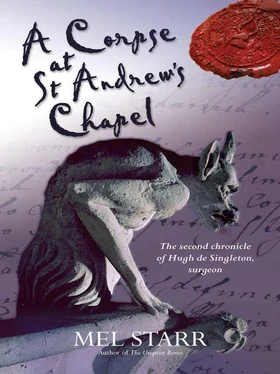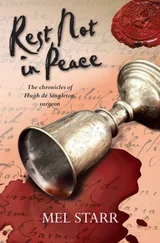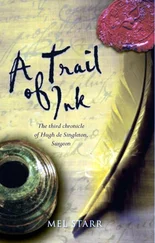Mel Starr - A Corpse at St Andrew's Chapel
Здесь есть возможность читать онлайн «Mel Starr - A Corpse at St Andrew's Chapel» весь текст электронной книги совершенно бесплатно (целиком полную версию без сокращений). В некоторых случаях можно слушать аудио, скачать через торрент в формате fb2 и присутствует краткое содержание. Год выпуска: 2010, Издательство: Kregel Publications, Жанр: Исторический детектив, на английском языке. Описание произведения, (предисловие) а так же отзывы посетителей доступны на портале библиотеки ЛибКат.
- Название:A Corpse at St Andrew's Chapel
- Автор:
- Издательство:Kregel Publications
- Жанр:
- Год:2010
- ISBN:нет данных
- Рейтинг книги:5 / 5. Голосов: 1
-
Избранное:Добавить в избранное
- Отзывы:
-
Ваша оценка:
- 100
- 1
- 2
- 3
- 4
- 5
A Corpse at St Andrew's Chapel: краткое содержание, описание и аннотация
Предлагаем к чтению аннотацию, описание, краткое содержание или предисловие (зависит от того, что написал сам автор книги «A Corpse at St Andrew's Chapel»). Если вы не нашли необходимую информацию о книге — напишите в комментариях, мы постараемся отыскать её.
A Corpse at St Andrew's Chapel — читать онлайн бесплатно полную книгу (весь текст) целиком
Ниже представлен текст книги, разбитый по страницам. Система сохранения места последней прочитанной страницы, позволяет с удобством читать онлайн бесплатно книгу «A Corpse at St Andrew's Chapel», без необходимости каждый раз заново искать на чём Вы остановились. Поставьте закладку, и сможете в любой момент перейти на страницу, на которой закончили чтение.
Интервал:
Закладка:
Practice began this day with the mark at 100 paces from the butts. Most arrows rose from the mark, then curved gently down to the targets, but not Andrew’s missiles. His arrows, loosed from that great bow, hardly lifted above the height of a man’s head before slamming into the butt with a resounding thwack.
Andrew’s arrows struck the target with such force that they were difficult to dislodge from the wooden butts. It was after the second volley that Andrew, attempting to draw an arrow, snapped the shaft while wrenching it from the target. He threw the broken arrow aside with a muttered curse, then returned to the business of withdrawing the point from the butt. The arrow was ruined, but the iron arrowhead could be reused, fitted to a new shaft.
I saw then how it might have been with Henry atte Bridge. An iron arrowhead might leave a wound similar to that of a slender dagger. And if the shaft broke off inside the wound the result might seem to be the work of a blade rather than an arrow. The iron arrowhead might remain, invisible, in Henry’s back, while the broken shaft lay on the forest floor to be discovered.
But how to determine if this befell Henry atte Bridge? His grave would need to be opened, the injury inspected. I berated myself and Hubert Shillside and the coroner’s jury for sloppy work. I have learned from this; what seems to be must be shown to be. A supposition, while usually accurate, is not always so, and must be proved before acceptance.
Uprooting a man from his rest in the churchyard is not a thing approved by most, for they expect to go there themselves eventually and prefer their slumber be undisturbed. I wished to exhume Henry quietly, inspect the wound in his back, and rebury him as quickly as might be. The fewer who knew of this, the better. If my intentions were known before I put spade to earth there might be those who would prevent me. Emma might see objection as a duty to her husband’s memory.
The more who knew of my plan, the more likely it was that some would object. At first I thought to approach the vicars of St Beornwald’s Church with my request.
The churchyard was their bailiwick, and Lord Gilbert’s lands were mine. But there would be three then who knew of my intention. None could be sure that the secret would be preserved. And what if one of the three forbid the excavation as sacrilege? Better to proceed without permission and on my own. If the exhumation provided no new information no one need know of it. If I discovered the point of an arrow embedded in Henry atte Bridge’s broad back, the find and my insight in seeking it would go far to forgive any insult to the dead, to the churchyard, to the vicars.
But could I dig up Henry atte Bridge without aid? The soil of his grave was yet soft and would be easy to remove. The grave itself would be easy to find, even in the dark, when I proposed to do the work. I resolved to invite the assistance of John Prudhomme, the new beadle. If I was discovered digging in the churchyard it would be John most likely to detect my midnight labor. Better he know of my intentions than stumble upon me, spade in hand, as he made his rounds after curfew. And another shovel at the work would speed the deed.
The new beadle was one of those who stood at the mark, bow in hand, as this scheme tumbled through my mind. Prudhomme was not a winner this day, nor had he ever taken a silver penny for his skill. Yet his arrows struck the target with regular accuracy, and he made the winners struggle for their prize. Perhaps one Sunday his skill might combine with luck and he would win. But not this day.
The ale was gone, the pennies awarded, and the sun resting on the upper branches of the west forest. I watched from the gatehouse as grooms carried the butts to the storehouse and participants and spectators drifted off to Mill Street and their homes. John Prudhomme and his wife and three children walked among them. I followed the throng, at a leisurely pace, then waited at the bridge until the streets were empty.
Shadows were long and only treetops glowed with a golden light when I approached the beadle’s house. I heard children’s voices within, and laughter. This family had enjoyed their day together and were now preparing with easy hearts for the night and slumber. I wonder if ever I might have such an experience? The thought so arrested my mind that I hesitated before the house, unwilling to intrude upon the scene.
Laughter ended abruptly with my first knock upon the beadle’s door. A late caller at any house is unlikely to bring good news. All the more so at the house of the beadle. John opened the door expecting, I think, some trouble, although certainly not the trouble he got.
I invited John to walk with me, an invitation he might have refused from another, but not Lord Gilbert’s bailiff. I wished to be out of earshot of all others, even his family, when I explained what I needed of him this night.
The beadle’s jaw fell when I explained that which I intended to do, and the part he was to play. But after I gave him the reason, and told him my suspicion, he agreed reluctantly to the role I asked of him. Most men like to see the resolution of a mystery, even if so doing seems to toy with peril.
So it was that in the middle of the night I procured a shovel and a length of rope from the marshalsea storeroom and took a stub of a candle from the hall. Bruce nickered softly as I passed his stall, expecting, perhaps, an outing. But he did not wake the marshalsea and I was able to climb to the parapet undisturbed.
I crept silently to the north wall, as far away as I could get from Mill Street and the castle gatehouse. I could see, in the glow of a waning moon just up over Bampton rooftops, the Ladywell. Hermits and pilgrims sometimes spend the night at the well, in prayer and meditation. I hoped, be there any such at the well this night, they were either asleep or entranced.
I leaned as far over through a crenel as I could and let the shovel fall. The earth below was soft from recent rain and shadowed from the sun. The shovel hit the sod softly and I was reassured.
I tied knots in the rope to aid my ascent, then tied the rope about a merlon before throwing the loose end to the ground. I slid down the line, retrieved the shovel, and walked quickly to Mill Street and the bridge. I was without concealment while on the bridge, so hastened to cross the brook. I would gaze into its dark waters another time.
John Prudhomme awaited me at the churchyard. He sat in shadow, his back against the wall, so I was startled when he spoke.
“Whereaway is this grave, then?” he whispered.
I motioned for him to follow through the lych gate and led him to the corner of the churchyard where soft dirt underfoot and a pale, sandy reflection of the rising moon indicated a new grave.
We set to our work, attempting to achieve two uncomplementary goals: speed and silence. John whispered as we began the work that he had been careful to see that the town streets were empty before he went to the church to await me. So we gave ourselves over to speed and were less stealthy in the work than we might otherwise have been.
Beads of sweat soon popped out on my forehead and dripped in my eyes. ’Twas not warm. Anxiety was the more likely cause, I think.
St Beornwald’s Churchyard is a place of many burials. It has been hallowed ground since before the Conqueror crossed from France to take the throne of England. Now, when a grave is dug, those who do the work are likely to come upon another before they have excavated any great depth. So it must have been for those who buried Henry atte Bridge. We were barely past waist deep when my shovel struck something soft yet unyielding. John detected the change in the pattern of my work, and soon he also motioned that his spade had met resistance.
Читать дальшеИнтервал:
Закладка:
Похожие книги на «A Corpse at St Andrew's Chapel»
Представляем Вашему вниманию похожие книги на «A Corpse at St Andrew's Chapel» списком для выбора. Мы отобрали схожую по названию и смыслу литературу в надежде предоставить читателям больше вариантов отыскать новые, интересные, ещё непрочитанные произведения.
Обсуждение, отзывы о книге «A Corpse at St Andrew's Chapel» и просто собственные мнения читателей. Оставьте ваши комментарии, напишите, что Вы думаете о произведении, его смысле или главных героях. Укажите что конкретно понравилось, а что нет, и почему Вы так считаете.












